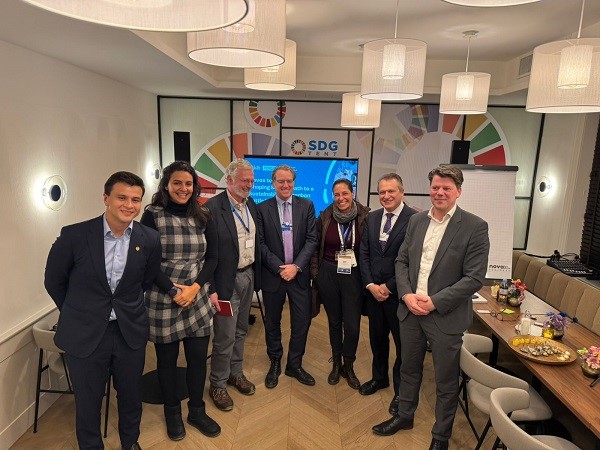3 million tags to improve livestock traceability in Pará

From left to right: Raul Protázio (Secretary of Environment and Sustainability of Pará), Manuela Maluf (President of IDH Brazil), Roberto Waack (Board Member of Marfrig), Jack Hurd (Executive Director of the Tropical Forest Alliance), Maria Netto (Executive Director of ICS), Gilberto Tomazoni (Global CEO of JBS), and Daan Wensing (CEO of IDH)
For over a year, JBS has collaborated as part of a coalition in the State of Pará on an ambitious and groundbreaking program in the Amazon region. We believe this initiative has the potential to transform not only Pará but also the entire cattle sector in Brazil. Together with our coalition partners, we are committed to ensuring its success.
The program aims to make the entire herd in Pará—26 million cattle—fully traceable by the end of 2026. This initiative involves collaboration between government, producers, civil society, and industry, including key partners such as The Nature Conservancy (TNC) and IDH.
As part of this effort, JBS and its partners will donate 3 million tags to track the herd in Pará and support producers with the tagging process. In addition, JBS is launching the “JBS Accelerator” program to support its indirect cattle suppliers in adopting the tags. This initiative includes all necessary services throughout 2025 to assist producers in applying them. Teams from JBS and its partners will identify and visit farms to carry out this work, using traceability operators trained and accredited by Pará’s state program.
This initiative was announced on Wednesday, January 22, during the “Davos to Belém: Shaping Brazil’s Path to a Sustainable, Low-Carbon Cattle Industry” session, hosted by IDH at the World Economic Forum Annual Meeting in Davos.
Throughout 2024, JBS conducted a pilot program tagging 28,000 cattle in Marabá and Redenção to evaluate technology and animal transit requirements established by the Pará working group. The findings from this pilot have provided valuable insights to shape the future design of the sustainable cattle program.
Additionally, we expanded technical assistance services through our Green Offices last year, offering business management consulting, training on animal care and nutrition, improved pasture management, and support for adopting regenerative farming practices. Producers can now access these services via email, phone, or WhatsApp through the Virtual Green Office.
In 2024, Brazil’s Ministry of Agriculture also launched the National Plan for Individual Identification of Cattle and Buffaloes and the Agro Brazil+Sustainable Platform.
The Agro Brazil+Sustainable Platform represents a breakthrough in public service innovation. By integrating various government databases, it enables rural producers to provide essential information, such as the place of origin, production methods, sustainable practices, and certifications. Buyers also gain access to this information, promoting transparency across the supply chain.
JBS is fully committed to implementing these new tools across its supply chain.
These efforts build on the robust monitoring systems JBS already applies to its cattle purchases across Brazilian biomes.
We recognize both the responsibility and opportunity to act within our supply chain to reduce emissions associated with food production.
If you would like to learn more about these initiatives, we are available to arrange calls to discuss them in greater detail.
For more information, see:
